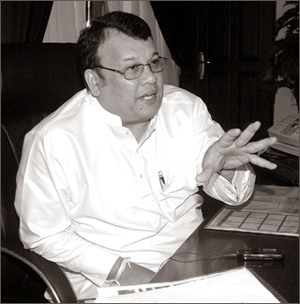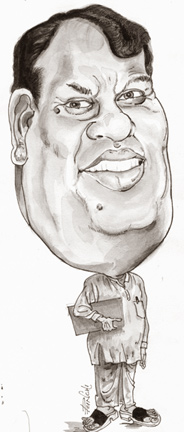Lanka to raise UN HR Commissionerís partiality - Minister Mahinda
Samarasinghe
by Manjula FERNANDO
|

Minister Mahinda Samarasinghe
|
Human Rights and Disaster Management Minister Mahinda Samarasinghe,
in an interview with the Sunday Observer, outlines Sri Lankaís
counteraction to the US State Department Report and the current position
with regard to GSP Plus issue.
Q: President Mahinda Rajapaksa is to appoint a committee of eminent
persons to inquire into the US State Department Report containing war
crimes allegations. What type of a bearing will this report have on Sri
Lanka?
A: The report is not initiated by the State Department on its own. It
was done on a request by the US Congress, Sub-committee on
Appropriations, in the course of the debate on the Appropriations Bill.
It is customary to ask for such reports. Sri Lanka is not the only
country on which a report has been called for. There is a host of
countries like Afghanistan, Iraq, Pakistan, Mexico, Sudan, etc.
The other point is the State Department has clearly stated that there
is no legal foundation to this report. Neither can they vouch for the
accuracy of the information contained in the report.
The third point is that the report has been put together with the
information from the US Embassy in Colombo, or other diplomatic missions
and unnamed sources as well as HR organisations like Human Rights Watch
and Amnesty International.
We know that the US State Department had been receiving and
collecting information and putting out their annual Human Rights Report
where reference is made to Sri Lanka. I presume this information was
there already and to many of these incidents listed in the latest report
we have already responded within that period, in January and May.
There are people giving wrong interpretations to this whole exercise.
The State Department has stated that they cannot vouch for the
accuracy for any of the incidents. This fact has been deliberately
ignored by certain people who have commented on this. But
notwithstanding all this I think the President has taken the right
decision to appoint a committee to study the allegations.
This is the way a democratic nation always acts or else we could have
hidden behind the fact the State Department has said that the report was
based on unverified incidents.
Q: Will this trigger a chain reaction?
A: No. We need to look into this and find out if these have actually
happened. When money is being allocated obviously the Members of
Congress want additional information with regard to the situation in
countries concerned. It is in this context the report is awaited.
 Once we have our report in hand, we will formulate our position in
respect of each one of these allegations. This was the strategy that we
used in the Channel 4 incident. Our response was based on scientific
evidence. We proved that it was a doctored video. No one now talks about
what Channel 4 showed. Once we have our report in hand, we will formulate our position in
respect of each one of these allegations. This was the strategy that we
used in the Channel 4 incident. Our response was based on scientific
evidence. We proved that it was a doctored video. No one now talks about
what Channel 4 showed.
And the same goes with the four doctors who were used during the
height of the conflict by international media to say that there were
significant HR violations.
Q: Who are the members of this Presidential Committee?
A: The President will decide the names and will make the
announcement. Currently we are working on the terms of reference and we
would be able to announce it in a few days time. It will be an
independent committee and there will be no politicians.
Q: The UN office of the High Commissioner for Human Rights Navi
Pillai has called for an inquiry similar to Gaza Fact Finding Mission to
investigate the allegations in the report. How does the Government view
this?
A: We are very sad to see the High Commissionerís office showing this
kind of subjectivity and partiality. A clear majority of the members of
the UN differ on this view. The Spokesperson of the OHCHR has clearly
jumped the gun by comparing this report with the one on the Gaza and
Goldstone process.
The State Department report clearly stated:
ďThe Report does not reach legal conclusions as to whether the
incidents described therein actually constitute violations of IHL,
crimes against humanity or other violations of international law nor
does it reach conclusions concerning whether the alleged incidents
described therein actually occurred.Ē
The spokesman has ignored this fact and rushed to issue the
statement. It is very unprofessional and ethically wrong.
I must say for sometime now we have been along with some other
delegations who participate in HR council sessions, concerned about the
subjectivity shown by the OHCHR on certain issues. Certainly in respect
of Sri Lanka, the HCís office seems to be very biased.
A very objective resolution was passed at the special sessions on Sri
Lanka at the Human Rights Council on May 26, just seven days after the
end of the conflict. Twenty-nine out of 47 voted in favour of this
resolution and a clear majority decided by vote not to consider debating
the amendments submitted primarily by the Western Block.
This sent a clear message that after defeating terrorism, Sri Lanka
must get help from member states for its post-conflict humanitarian
needs instead of asking the country to turn the clock back.
Against this backdrop the HC when addressing the Council a week later
made a statement welcoming the special session on Sri Lanka but did not
refer to the very clear outcome - the adoption of the resolution by two
thirds majority by an inter-governmental decision.
This even prompted the Indian Permanent Representative in Geneva to
ask the HC as to why she did not welcome this decision.
These are one or two examples of the subjectivity shown by the OHCHR
of late.
I am convinced that we will have to investigate more closely the
functioning of this office and this thinking is entertained by quite a
number of delegations in Geneva.
We will respond quite firmly to any uncalled for or unwarranted
statements coming out from HCís office which contribute to further
destabilisation, even intensifying ethnic tensions.
Q: Do you intend to take this matter up at the UN level?
A: Letís see. We are very concerned.
I want to make this point first to the High Commissioner herself. If
I do not get a satisfactory answer then I have to look at other ways of
seeking redress.
We are not asking for special treatment for Sri Lanka but we are
saying not to show such outright bias which we have seen of late.
I have told the HC that we are available to sit down and discuss any
problem. Although we had one or two issues with her predecessor Louise
Arbour, we had a practice of discussing a problem first before public
statements are issued.
OHCHR is an organisation which can add value to the work we are doing
in Sri Lanka to protect human rights of all citizens after defeating
terrorism and we are willing to work with her in this respect.
Q: The European Union maintains that investigating human rights is a
condition under which GSP+ is granted ?
A: They are at liberty to say and do what they think is best before
granting GSP concessions once again to Sri Lanka.
But they have to bear in mind that we have just come out of a 30 year
conflict and we need time to bring the entire country into the
democratic framework.
We have never said that everything is perfect in Sri Lanka. We do
have problems and we are in the process of addressing them. My ministry
has taken the lead role in putting out a national action plan on the
promotion and protection of Human Rights. This action plan acknowledges
honestly where we are now and proposes a time bound strategy to get us
to a much better position. This process was initiated eight months ago,
not recently to please GSP conditions.
My point of view is that we should be given more time by our friends
in the EU to demonstrate that we are committed to tackling these issues
in a methodical and systematic manner.
I feel there is better understanding emerging out of the EU that we
should be given more time. I am fairly confident that once they see this
action plan that they would be more convinced of our commitment. We will
be continuing our dialogue with the EU over the GSP issue.
Q: There are accusations that the IDP resettlement has been put in
fast gear to please the EU to obtain GSP concessions?
A: The IDP resettlement program was on the cards. Our pledge was to
resettle the bulk of the IDPs by January 31, 2010. We have gone on
record saying this. This is a step in that direction.
But I am sure the members of the EU would no doubt be happy with the
recent progress made on this front and it will reflect positively in the
final decision on GSP concessions to Sri Lanka.
The Government has so far resettled nearly 100,000 IDPs, bringing
down the numbers housed at the Vavuniya Menik Farm camp to about 180,000
from the original 280,000.
Resettlement has been completed in the East and is continuing in
Kilinochchi, Mullaitivu, Jaffna and Mannar districts in the North. |

